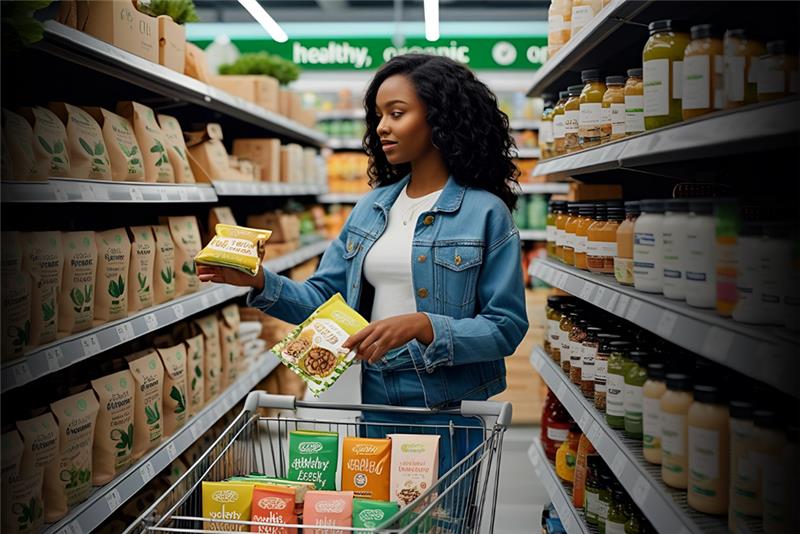Adapting to Consumer Demand for Health-Conscious Products

In recent years, the consumer landscape has dramatically shifted toward health-conscious living. This transformation is no longer a mere trend but a fundamental change that reshapes how people shop, eat, and make lifestyle choices.
Today, of Americans prioritize health when choosing food and beverages, fueling explosive growth in everything from high-protein snacks to non-alcoholic drinks designed for wellness.
As market researchers, understanding this growing consumer appetite for health-focused products is vital for guiding brands and businesses toward success.
A New Era in Grocery Shopping
Instacart’s latest data reveals a major shift in how Americans shop for groceries online. Between 2023 and 2024, searches for ‘high protein’ foods jumped 39%, while ‘high fiber’ interest soared an incredible 159%. Low-sugar purchases rose 9%, and low-carb products climbed 8% since 2021.
For market researchers, this data is pure goldmine. It shows consumers aren’t just chasing individual nutrients anymore — they’re embracing a whole-body approach to health. Shoppers now focus on products that boost metabolism, support digestion, and sustain energy throughout the day.
Why are consumers gravitating toward healthy products?
Kelly Springer, a registered dietitian from Skaneateles, New York, shares a perspective that adds depth to these numbers. She points out that online grocery services like Instacart are helping people make healthier choices. This way, people are being steered away from those last-minute impulse buys that often happen in physical stores.
These digital platforms curate options that make it easier to grab nutrient-packed foods instead of purchasing whatever’s quick and convenient. High-protein products aren’t just for gym-goers anymore — they’re popular with anyone looking for a natural energy boost or better metabolism. And the growing buzz around fiber-rich foods shows people are starting to really get how gut health connects to brain function and overall wellness. It’s a sign that shoppers are becoming more thoughtful and informed about what they eat.
Emerging trends in health-conscious products
- High-protein power
Protein-packed products are booming as consumers focus on muscle health and sustained energy. This demand spans snacks, dairy, and plant-based options, making high-protein a staple across categories. - Non-alcoholic boom
The rise of non-alcoholic beverages is reshaping the drinks market. From sophisticated mocktails to probiotic waters, shoppers are choosing wellness-driven alternatives to traditional alcohol. - Clean labels win
Shoppers are reading labels like never before. And they’re favoring simple, natural ingredients. Nearly 80% prefer fresh, minimally processed foods. Brands that prioritize transparency and honest sourcing are winning consumer trust. - Nutrition, personalized
Technology is pushing the shift toward customized nutrition. Tailored supplements, meal plans, and functional foods are meeting consumers’ unique health goals like never before.
Market research implications: opportunities and challenges
For researchers, these evolving trends open several avenues for exploration and advisement:
- Segmentation and targeting: As health-focused searches rise, companies can fine-tune their audience by diet and wellness goals. This helps create sharper product positioning and marketing that truly speaks to consumers.
- Product innovation: The surge in non-alcoholic cocktails (+350%), prebiotic and probiotic drinks (+58%), and a comeback of tinned fish shows clear opportunities. Investing in gut health, inflammation relief, and hydration products is a smart move.
- Behavioral insights: Knowing that online grocery shopping encourages healthier picks can help brands optimize digital shelves. Personalized recommendations can boost sales of these health-conscious products.
Forecasting the health-conscious market
The move toward health and wellness shows no signs of slowing down. Instacart’s trends analyst, Alex Orellana, points out that low-carb diets are still going strong. People appreciate the steady energy and weight control they offer.
At the same time, sales of electrolyte drink powders have jumped 36%, and coconut water is up 7%. This highlights a growing demand for hydration and functional beverages.
For market researchers, this means one thing: keep watching the data closely. Spotting new trends early— whether it’s gut health, inflammation relief, or innovative drinks, can give businesses a real edge. Those who adapt quickly to changing tastes are anticipated to lead the pack.
this might be a competitor, can we still mention them?
